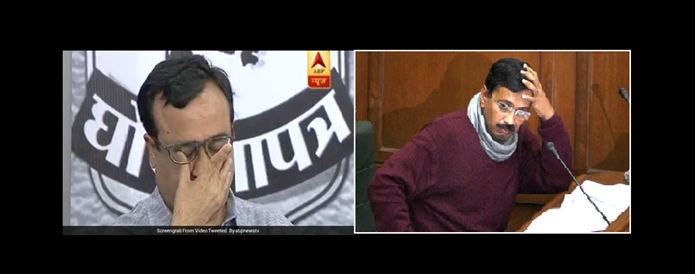Baby, Don't Cry...

NEW DELHI: Municipal Corporation elections are easy to predict, as the scale is small and the voters vocal. Hence, it was known almost from the start that the Bharatiya Janata Party had manouvered itself into a position to sweep the MCD polls in Delhi, with most outside the political party system either indifferent, or going out actively to vote the BJP in. A sweep was on the cards, as the opposition crumbled in front of us Delhi wallahs by its very non-presence on the ground.
In fact there were only two slightly surprising elements to the civic polls. One was of course, the Congress party whose Ajay Maken spent all his time campaigning against the Aam Aadmi party and had little to say against the BJP. When asked about this by an inquisitive reporter, a Congress local leader said that AAP was eating into the Congress base and had to be removed from the scene. And so busy was the Congress doing that, that the BJP virtually sailed in without any opposition.
And as part of the same one, it is interesting how Maken---he has fortunately resigned though the party remains with any number of leaders as un-grounded as him starting from the top----kept insisting till the nth day that the Congress would be in second place with the AAP vanquished. The implication thus was, that of course the BJP will win but at least the Congress will be the runner up. At that point some of us scribes discussing the polls even thought of calling him to say that no sir, the Congress will be third down the line, but desisted. Why dampen the enthusiasm, and in fact this has become a Congress pattern. It always believes it is doing better, even when it is wiped out in polls across the states, as clearly it does not have any connect with the voters and the field.
The second surprising element is Arvind Kejriwal himself. He really did seem to believe that AAP would sail ahead, and the current whining by AAP leader Gopal Rai: “"This chamatkari (magical) victory of the BJP - this is only EVM lehar (wave) not Modi lehar," seriously does not cut ice. In fact, if anything AAP’s defeat is a cumulative result of all that has gone before---the concerted attack on the party and its leaders and officeers that has been going on for months now, and the demoralisation of the defeat in the Punjab polls.
It is true, that now it has been raised, the Election Commission should quell all rumours and suspicions by allowing a panel of experts to hold a random check on the EVM machines. This is imperative as otherwise even a clean, democratic process will come under the scanner of suspicion with India’s elections becoming controversial instead of decisive. The issue has been raised after the Uttar Pradesh polls, with faulty machines being found in Maharashtra, and more recently in Madhya Pradesh, and hence the check is necessary and essential.
But the main reason, that has been and will be visible increasingly in the states as well, is the absence of an Opposition on the ground. AAP that was strong at one stage and fighting fit as it were, has been reduced to a shadow with its workers demoralised, and its politics divided. Kejriwal himself has been unable to rise to the occasion, and given the kind of attack on AAP ---from the Jung days onwards---it has certainly not been easy. The Punjab defeat has left traditional AAP enthusiasm in shambles, and the party has been unable to get over the setback to face the MCD polls in full form.
But instead of finding solace in unity the Opposition parties continue to regard each other as the main enemy, and in the process the BJP with a far better organisational reach and dynamos like PM Narendra Modi and BJP chief Amit Shah at the helm changing strategy as and when required are able to bring the party home with relative ease. The Delhi civic polls was a breeze in that Shah did not even bother to campaign, beyond setting the organisational details in place.
In UP, the BSP and Samajwadi party spent as much time---some say more---in attacking each other than in opposing the BJP. Both were convinced they would win, with the Congress even more certain than its Samajwadi ally. In Delhi, the Congress reserved its fading strength to attack AAP with the BJP remaining out of its sights altogether. In Bihar, the BJP was not able to win the polls as the two main rival--Nitish Kumar and Lalu Yadav---had come together but now new doors have opened as the two are sniping at each other on a daily basis. So much so that Chief Minister Nitish Kumar has preferred to sit with PM Modi, than with his ally Lalu Yadav while the Congress is there and yet not there.
So here is a 10 point chart for the Opposition parties--- in Delhi’s case AAP and Congress---to start with. There is a lot more but even this little could change the Opposition picture:
1. Introspect;
2. Work fast towards inner party democracy all lack, for different reasons;
3. Change leaders who are not delivering;
4. Bring in collective, democratic functioning;
5. Strengthen organisation on the ground--- it does not exist for most and yet they fight elections;
6. Move out of the bungalows into the streets, be accessible, meet people;
7. Bring out the younger people, and retire the old who are just baggage;
8. Identify four issues to take up and build campaigns around these;
9. Be young in approach---jingles, music, youth cadres in a sustained and organised campaign;
10. And be in the field, campaigning regardless of whether there is an election or not.
As for talking to each other. Try. It might be better and more productive than just crying about EVMs.



